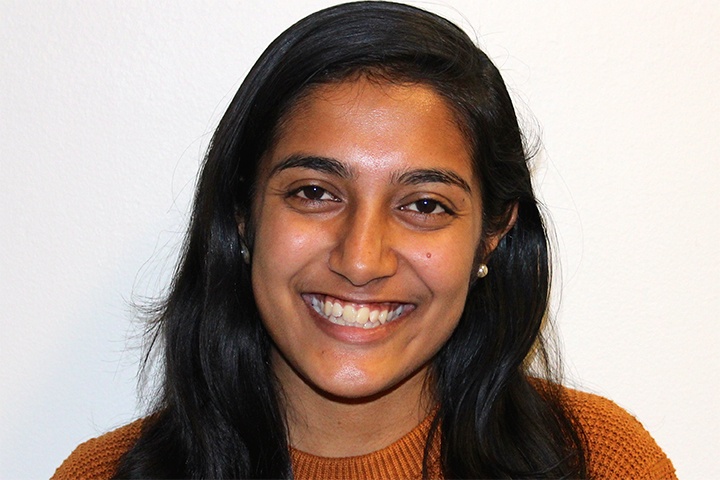Anoushka Bose: Targeting a career in security studies and diplomacy through a fusion of physics and political science

Anoushka Bose (Physics, Political Science, '20)
Anoushka Bose arrived at MIT in 2016 intent on pursuing problems related to climate change and energy. But two years later, she found herself discussing arms control and international security with Russian foreign minister Sergei Lavrov during a policy forum connecting American and Russian students.
"It was eye opening for me," says Bose, a double major in political science and physics. "I thought it was fascinating to see how politics and diplomacy work between countries that don't share the same motivations."
In the wake of this experience and a set of equally transformative internships, Bose is now on a new trajectory, moving purposefully toward a public service career in nuclear policy and diplomacy.
Passion for policy and science
Growing up in the San Diego area, Bose gravitated toward physics and chemistry in her STEM-oriented high school. But the extracurricular project that completely captivated her was her community's year-long research and writing competition that traditionally focused on a historical topic. Bose's subject: the Clean Air Act.
"This project substantively shaped my interests," she says. Bose found it "enlightening" to study both the science behind air pollution, and the political movement that helped nail down the legislation. "I realized I had passions for both the social sciences and science."
Bose inclined initially toward nuclear science and engineering at MIT because she saw "nuclear energy as the pinnacle solution to climate problems." She later migrated toward physics, where she hoped to gain more latitude to pursue clean energy policy questions as well.
But it was her engagement with political science that propelled Bose on her current academic path.
Venturing into Riots, Rebellions and Revolutions (17.581), taught by Roger Petersen, Arthur and Ruth Sloan Professor of Political Science, Bose says "a gate opened for me into national security." With its hybrid focus on American and international politics, the class "gave me both knowledge and respect for the entire security enterprise of the U.S."
This class, along with U.S. Military Power (17.482-3), taught by Barry R. Posen, Ford International Professor of Political Science, "kicked off several semesters dedicated to security studies," says Bose. "This area seemed like it might be really fulfilling as a career." The summer after her sophomore year, she grabbed a chance to test her premise.
The DC experience
With the help of the MIT Washington DC Program, and Ernest J. Moniz, former U.S. Secretary of Energy and Cecil and Ida Green Professor of Physics and Engineering Systems, Bose landed an internship at the Nuclear Threat Initiative. Plunging into research about safeguarding nuclear materials in central Asia, protecting against radiological challenges, and the potential impacts of a nuclear winter after a small-scale nuclear exchange, Bose strongly felt, "This is the kind of place where I want to be."
The Initiative's mission also made an impact on Bose: "I thought maybe I should be exploring global nuclear safety, proliferation and security issues rather than energy," she says. With this in mind, she seized an opportunity to dive even deeper into this area, applying for one of 20 US spots in the Stanford-US Russia Forum.
Running September 2018 through April 2019, this project brought Bose together with a small group of U.S. and Russian students to discuss the Intermediate-Range Nuclear Forces (INF) Treaty, from which the Trump administration had decided to withdraw. Meeting virtually and then in person (in both Moscow and D.C.) to present policy ideas, Bose and her partners tried to offer solutions that might prove mutually, politically beneficial.
"From the policy making side, I hadn't understood the power of individuals to shape what gets done," she says. "It was really interesting working with the Russians, who often spoke bluntly, and who did not routinely view the U.S. as having pure motivations."
While laboring over the research and writing for this policy project, Bose continued to delve deeper into security studies at MIT. "I needed to gain knowledge and confidence in understanding international crises," says Bose.
Increasingly sure that she "wanted to do something involving diplomacy and international relations," Bose secured another internship in Washington last summer, working on nuclear energy policy at the State Department. Even though she hoped to concentrate on weapons and proliferation, Bose was eager "to learn about the processes of government and bureaucracy."
The internship did not disappoint. Bose worked on bolstering U.S. nuclear energy business in countries around the world seeking nuclear power. "I had not internalized how the State Department on a daily basis uses nuclear energy as a policy thrust," she says. She also helped develop U.S. nuclear cooperation accords with Argentina and Romania. "I was so excited to see something come out of my advocacy," she says.
These real-world experiences "sealed the deal" for Bose. "After last summer I knew I wanted to work in nuclear policy focusing on security," she says. Today, under the direction of political science associate professor Vipin Narang, she is delving into the issue of global noncompliance with nuclear materials—work for which she has been named a presidential fellow at the Center for the Study of the Presidency and Congress.
She hasn't abandoned energy, though. She serves as president of the MIT Energy Club, devoting considerable time to hosting events as she finishes coursework for her double major. She is applying both to law school, and for a fulltime job next year in Washington in policy and/or diplomacy.
In a world challenged by nationalism and conflict, Bose retains a sense of optimism and commitment to a larger goal—a safer world. "It's simple for me to believe in the power of cooperation and trust especially after working alongside Russian students all year," she says. "I learned that both sides deeply value nuclear security, and neither side wants a much more dangerous world where no one wins," she says.